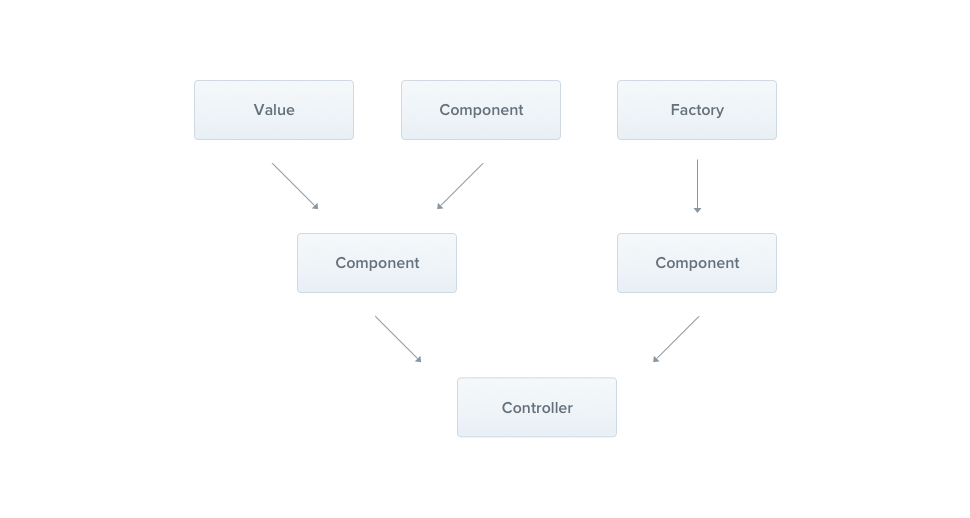Injectables are a fundamental concept in Danet. Many of the basic Danet classes may be treated as a provider – services, repositories, factories, helpers, and so on. The main idea of a provider is that it can be injected as a dependency; this means objects can create various relationships with each other, and the function of "wiring up" instances of objects can largely be delegated to the Danet runtime system.
 Image from nestjs documentation
Image from nestjs documentation
In the previous chapter, we built a simple TodoController. Controllers should handle HTTP requests and delegate more complex tasks to injectables. Injectables are plain JavaScript classes that are declared as injectables in a module.
info Hint Since Danet enables the possibility to design and organize dependencies in a more OO way, we strongly recommend following the SOLID principles.
Services
Let's start by creating a simple TodoService. This service will be responsible for data storage and retrieval, and is designed to be used by the TodoController, so it's a good candidate to be defined as a provider.
import { Injectable } from 'https://deno.land/x/danet/mod.ts';
import { Todo } from './todo.interface';
@Injectable()
export class TodoService {
private readonly todos: Todo[] = [];
create(todo: Todo) {
this.todos.push(todo);
}
findAll(): Todo[] {
return this.todos;
}
}Our TodoService is a basic class with one property and two methods. The only new feature is that it uses the @Injectable() decorator. The @Injectable() decorator attaches metadata, which declares that TodoService is a class that can be managed by the Danet IoC container. By the way, this example also uses a Todo interface, which probably looks something like this:
export interface Todo {
title: string;
description: string;
}Now that we have a service class to retrieve todos, let's use it inside the TodoController:
import { Controller, Get, Post, Body } from 'https://deno.land/x/danet/mod.ts';
import { CreateTodoDto } from './create-todo.dto';
import { TodoService } from './todo.service';
import { Todo } from './todo.interface';
@Controller('todo')
export class TodoController {
constructor(private todoService: TodoService) {}
@Post()
async create(@Body() createTodoDto: CreateTodoDto) {
this.todoService.create(createTodoDto);
}
@Get()
async findAll(): Promise<Todo[]> {
return this.todoService.findAll();
}
}The TodoService is injected through the class constructor. Notice the use of the private syntax. This shorthand allows us to both declare and initialize the todoService member immediately in the same location.
Dependency injection
Danet is built around the strong design pattern commonly known as Dependency injection. We recommend reading a great article about this concept in the official Angular documentation.
In Danet, thanks to TypeScript capabilities, it's extremely easy to manage dependencies because they are resolved just by type. In the example below, Danet will resolve the todoService by creating and returning an instance of TodoService (or, in the normal case of a singleton, returning the existing instance if it has already been requested elsewhere). This dependency is resolved and passed to your controller's constructor (or assigned to the indicated property):
constructor(private todoService: TodoService) {}Scopes
Injectables normally have a lifetime ("scope") synchronized with the application lifecycle. When the application is bootstrapped, every dependency must be resolved, and therefore every provider has to be instantiated. Similarly, when the application shuts down, each provider will be destroyed. However, there are ways to make your provider lifetime request-scoped as well. You can read more about these techniques on the following page!fundamentals
Provider registration
Now that we have defined a provider (TodoService), and we have a consumer of that service (TodoController), we need to register the service with Danet so that it can perform the injection. We do this by editing our module file (app.module.ts) and adding the service to the injectables array of the @Module() decorator.
import { Module } from 'https://deno.land/x/danet/mod.ts';
import { TodoController } from './todo/todo.controller';
import { TodoService } from './todo/todo.service';
@Module({
controllers: [TodoController],
injectables: [TodoService],
})
export class AppModule {}Danet will now be able to resolve the dependencies of the TodoController class.
 Danet
Danet